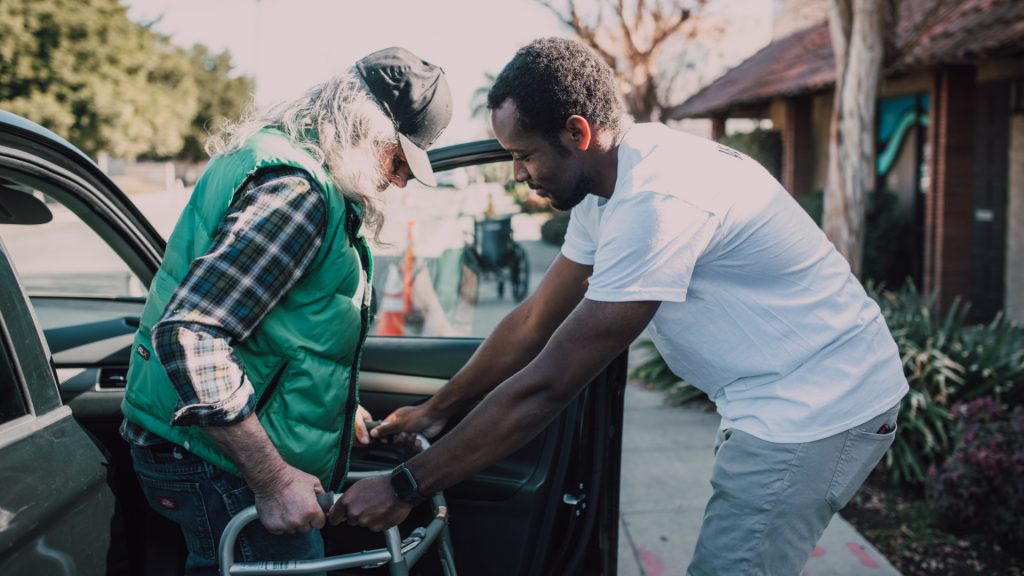Posts by reachchurch
To Live On
Read This Week: Mark 12
Jesus sat down opposite the place where the offerings were put and watched the crowd putting their money into the temple treasury. Many rich people threw in large amounts. But a poor widow came and put in two very small copper coins, worth only a few cents. Calling his disciples to him, Jesus said, “Truly I tell you, this poor widow has put more into the treasury than all the others. They all gave out of their wealth; but she, out of her poverty, put in everything—all she had to live on.” – Mark 12:41-44 NIV
Mark 12 is packed full of biblical and spiritual truth that we can apply to our lives every day. It is another example of the theme of Jesus’ actions demonstrated along with his teachings. He teaches in a parable to communicate that He alone is the cornerstone of faith, then practically imparts ethical lessons about our responsibilities as citizens and our duty to love God first, and then love other people as ourselves. In between, Jesus teaches us that He is the Messiah and not King David and that we should be vigilant and aware of false teachers that say otherwise and exploit people. This chapter is a theological and practical tour de force.
Perhaps its most poignant teaching comes at the end of the section with the story of the widow’s offering. It is an example and a warning against pride, especially pride revolving around self-importance, wealth, and stature. The Scriptures show us through this poor widow that if a person is or feels important because of their socio-economic status, money, power, profession, or title, their importance is fake. The heart and character of a person are what make them valuable. And those things cannot be earned, bought, acquired, or gifted. They come from walking with God, emulating His heart, and following His word.
There were chests around the walls of the court that people would drop their money and offerings in. It was in the open, so the crowds could see who gave and what they gave. The rich and pious would make a big deal out of their giving so that people would revere and praise them for their bountiful gifts. Verse 41 says:
Jesus sat down opposite the place where the offerings were put and watched the crowd putting their money into the temple treasury. Many rich people threw in large amounts.
Then, the poor widow comes along and puts in her offering, and it encompasses all that she has. It is everything that she has to live. Jesus is not impressed with the rich and religious, but he is humbled and moved by her sacrifice. He tells his disciples in verses 43-44:
Truly I tell you, this poor widow has put more into the treasury than all the others. They all gave out of their wealth; but she, out of her poverty, put in everything—all she had to live on.
The rich gave out of their abundance, but the poor widow gave all she had. It was not about the portion for her; it was about the proportion. The wealthy gave a small contribution because of their riches, but the widow gave her life. She gave all she had to live on, knowing that Christ and her offering to God were all she needed.
May we understand the same. May we realize that Christ is all we need to live. He is all we need to have significance, worth, importance, and riches beyond anything this world can offer. In Christ, what we live on is eternally sufficient to live life.
The Unfilled Seat
Read This Week: Mark 11
When they brought the colt to Jesus and threw their cloaks over it, he sat on it. Many people spread their cloaks on the road, while others spread branches they had cut in the fields. Those who went ahead and those who followed shouted, “Hosanna!” “Blessed is he who comes in the name of the Lord!” “Blessed is the coming kingdom of our father David!” “Hosanna in the highest heaven!” – Mark 11:7-10 NIV
Jesus Christ is unique. He is unique in all of eternity and human history. When Christ was on earth, his uniqueness was most seen in the hypostatic union of His humanity and divinity coming together in one individual existence. Out of this supernatural reality came another tenant of what made Jesus unique – His claim to be God. The author Thomas Schultz once wrote:
Not one recognized religious leader, not Moses, Paul, Buddha, Mohammed, Confucius, etc., has ever claimed to be God, that is, except for Jesus Christ. Christ is the only leader who has ever claimed to be a deity and the only individual who has ever convinced so many in the world that He is God.
This distinction that makes Jesus stand out among all the rest is also why He was the only one who could ride on that donkey into Jerusalem that day. He was the fulfillment of its prophecy, the Messiah for whom they had been looking. Jesus was the answer for everything, and that was His rightful seat of honor. He was the only one who could fill the unfilled seat. No one else had the power, authority, divinity, and eternal existence for the people to shout the things they did in verses 9-10:
Hosanna! Blessed is he who comes in the name of the Lord! Blessed is the coming kingdom of our father, David! Hosanna in the highest heaven!
These were the distinctions reserved for Jesus. He is the only one who claimed to be God, holds equality with God, raised the dead, forgave sins, died an atoning death, and rose from the dead. He is also the only one who said He is coming back for us. The person of Christ should always sit in that seat of honor.
He still deserves that place in the world and our hearts today. Often, just like the crowds that day who would later call for Him to be crucified, the root of our sin comes from trying to fill the seat Jesus alone can fill. We want to crown another and give them the throne of our lives instead of the one who rightly deserves it. We want to give the seat to a friend, a spouse, a job, a position, money, influence, and even ourselves. But none of these are worthy to sit there above all the others.
Jesus should be the occupant of the unfilled seat in our hearts first and foremost and therefore remain in control of our relationships, families, work, and activities. May we spread our coats on the road of our lives in front of Him. May we cut palm branches to wave in His honor as we shout, Hosanna (Save Us), and quote Scripture in our darkest and brightest moments. May we recognize Christ as supreme and yield to His authority to sit in the unfilled seat for all of our days and not just when we feel like celebrating Him.
Lead by Serving
Read This Week: Mark 10
Jesus called them together and said, “You know that those who are regarded as rulers of the Gentiles lord it over them, and their high officials exercise authority over them. Not so with you. Instead, whoever wants to become great among you must be your servant, and whoever wants to be first must be slave of all. For even the Son of Man did not come to be served, but to serve.” – Mark 10:42-45 NIV
The Christian pastor and author Henry Blackaby once wrote, “Spiritual leadership is effectively leading others on to God’s agenda and purpose.” Spiritual leadership aims to serve God and others. The point of spiritually leading people is to serve them by guiding their lives to the Lord and His will. Jesus put it like this in the second part of verse 43: whoever wants to become great among you must be your servant.
It is obvious in this section of Mark 10 that God wants us to be different than the world when it comes to leadership and our approach to people. Jesus explicitly says this in verses 42-43:
Those who are regarded as rulers of the Gentiles lord it over them, and their high officials exercise authority over them. Not so with you.
His desire for us as His followers and disciples is not to be leaders by worldly standards but spiritual leaders that reflect the heart of God and serve other people and the Gospel mission. Natural leaders are self-confident but spiritual leaders are confident in God. A natural leader makes their own decisions, while a spiritual leader seeks God’s will in those decisions. A natural leader is ambitious only, but a spiritual leader is humble in their pursuits. Natural leaders create methods, enjoy power, seek rewards, and flaunt their independence. A spiritual leader follows the Holy Spirit, delights in obedience, loves Jesus and people, and values dependence on God.
Jesus states the way the world leads and deals with others should not be so with followers of Christ. The difference lies in who is leading us. The filling of the Holy Spirit is the essential catalyst to spiritual leadership. Nothing is more awkward, futile, and destructive than a person trying to lead spiritually without being led by the Spirit themselves. The natural leader can lead and perform tasks in the church and world but cannot serve Jesus and people in a way that honors God and is of eternal value.
Our encouragement from the Scriptures is to lead and serve like Jesus. Verse 45 reminds us that He is the ultimate example of servant leadership and the bar of excellence in how we should conduct ourselves on mission. He said even the Son of Man did not come to be served, but to serve, and to give his life as a ransom for many. This standard of leadership was good enough for Christ, and it is certainly good enough for us.
No Distraction
Read This Week: Mark 9
“If anyone causes one of these little ones—those who believe in me—to stumble, it would be better for them if a large millstone were hung around their neck and they were thrown into the sea. If your hand causes you to stumble, cut it off. And if your eye causes you to stumble, pluck it out. – Mark 9:42-50 NIV
As of 2021, the United States ranked 3rd in the world with over 313 million active internet users nationwide. Over 90 percent of Americans have access to the internet, with many responding that they could not imagine a life without it. Additionally, 296 million people in this country use social media, and 82 percent of those individuals use it mostly on their mobile phones. Mobile platforms and devices consist of over 50 percent of internet access. All of this does not account for TV viewing, time spent at work and school absorbing information, participating in extracurricular activities, and interacting with family, friends, and co-workers.
We are bombarded with information, data, and distractions to last a lifetime. There is so much white noise and obstacles to clear thinking, mindfulness, and concentrating on things that will enrich and transform our lives. It takes a tremendous and concerted effort to stay focused on what matters and stay consistent in pursuing God and an intimate relationship with Christ. We have enough to contend with and do not need additional barriers to hear the Gospel, absorb the truth, be encouraged, and continue serving the Lord.
This idea of being a stumbling block to others is what Jesus addresses at the end of Mark 9. He just finished teaching that anyone who gives a cup of water in my name belongs to the Messiah (v.41), and He is intent on instructing believers to be sure they are not preventing others from knowing and following Him even in the little things that we may take for granted. Jesus says in verse 42:
If anyone causes one of these little ones—those who believe in me—to stumble, it would be better for them if a large millstone were hung around their neck and they were thrown into the sea.
These little ones referred to in this passage are all God’s children and those who follow Christ. This teaching is a sobering and direct challenge to the danger of causing others to stumble relationally, stop serving God, or walk away from faith altogether with our words, actions, and behaviors.
The way we conduct ourselves and treat others in the family of God and the world is essential to a life that honors Jesus and makes a positive impact. When we have pervasive sin issues in our lives, do not get along with each other, and are at enmity with people, it can be an unnecessary distraction to truth and a stumbling block that impedes the path to salvation.
Jesus is pointed in his message to us that whatever may be in our hearts and lives that cause us to stumble and therefore causes others to stumble must be taken out and removed. We must deal with these things drastically so that our lives are not on the list of hurdles, diversions, and confusing elements that keep people from the Good News of Christ and from being built up and edified in the Spirit.
Serious matters like being a stumbling block require serious measures to prevent and change it in our own hearts first and then in the Christian community as a whole. We should constantly examine ourselves to make sure we are not a distraction to the purposes God has for our lives, for His church, and for those He loves that are far from Him. As Jesus taught us here, we should be committed to doing whatever it takes to remove things that will take away from His glory and harm His mission.
Total Recall
Read This Week: Mark 8
During those days another large crowd gathered. Since they had nothing to eat, Jesus called his disciples to him and said, “I have compassion for these people; they have already been with me three days and have nothing to eat. If I send them home hungry, they will collapse on the way, because some of them have come from a long distance.” – Mark 8:1-3 NIV
Total recall is defined as the ability to recall images, sounds, or objects in memory with extreme precision. Total recall is also known as Eidetic Memory, which is recalling an image from memory with high accuracy for a time after seeing it only once. Eidetic is from the Greek word eidos, meaning seen. It would be easy for us to glance at the events of Mark 8:1-10 and think that we had seen this before, that it is a total recall of something we had just read. Our eidetic memory kicks in and tells us that the story and miracle in Mark 8 is the same one we just studied in Mark 6:30-44. But it is not the same.
Those who will try to find inconsistencies and contradictions in the Bible often get tripped up by the events of Mark 8:1-10 with the feeding of the five thousand. But it is not the same story with seeming discrepancies as to the narrative in Mark 6:30-44 as they are two different accounts. Take note of the differences below:
Mark 6:30-44
Bethsaida
Mostly Jews
5 Loaves & 2 Fish
5,000 People
1 Day
12 Baskets Left
Small Baskets
Mark 8:1-10
Decapolis
Mostly Gentiles
7 Loaves & Few Fish
4,000 People
3 Days
7 Baskets Left
Large Hampers
Notice that they take place in two different settings, in front of two different crowds and cultures, with distinct circumstances, needs, and timeframes. What remains consistent in both accounts and is a total recall of the previous story, is the compassion of Jesus for the people and his exercise of eternal power to do a miracle on their behalf. The authority, actions, and outcome of what the Savior accomplishes is a total recall.
However, the disciples did not have total recall of what Jesus had previously done. Their memories were short when it came to His miracle-working power. Even after they had witnessed the feeding of the five thousand, they forgot that the Lord could do the same thing again. When they had the perfect opportunity to remember and apply faith, they responded with doubt and unbelief in this question: But where in this remote place can anyone get enough bread to feed them?
Although the disciples’ reaction is disappointing and frustrating, it is difficult to be hard on them. We have some of the same tendencies in our life with God. We often forget His mercies and goodness of the past and fail to apply them to current situations. We can disregard the miracles He has done when remembering His grace and provision would fill us with faith and joy.
We need better and more precise recollection in our spiritual walks. We need to be aware of what we’ve seen before from the Lord and implement it regularly in our actions, devotion, and our witness before the world. We need total recall that Jesus Christ never changes. He remains the same and has the solution to every problem no matter the situation. We need spiritual eidetic memories so we can be confident in, trust, and obey God while experiencing the new miracles and success that He alone brings.
No Lip Service
Read This Week: Mark 7
So the Pharisees and teachers of the law asked Jesus, “Why don’t your disciples live according to the tradition of the elders instead of eating their food with defiled hands?” He replied, “Isaiah was right when he prophesied about you hypocrites; as it is written: “‘These people honor me with their lips, but their hearts are far from me. They worship me in vain; their teachings are merely human rules.’ You have let go of the commands of God and are holding on to human traditions.” – Mark 7:5-8 NIV
No one among us has ever not been guilty of our words being more prominent about something than our actions. No one is immune to talking more about what we are going to do than actually doing it. There is not a person on the planet earth, no matter how pure or well-meaning they are, that has not put a greater emphasis on what they say or think than they do their initiative and application. This practice is especially true in our life with God and our service to Him. We have all been guilty of paying lip service to our worship and spiritual walk or making insincere declarations that we supposedly believe or value.
But just because we are prone to lip service instead of action in our walks does not mean we should not try to live differently. We should call upon the Holy Spirit and immerse ourselves in the word of God to be doers and not merely talkers. We should ask God to help us daily to put away our pride and self-reliance and submit to His will of genuine worship. This posture and attitude are what Jesus was admonishing the Pharisees for in Mark 7. He told them that they were hypocrites and cared more about tradition and paying lip service to their religious rules than worshipping and serving the Lord. Verses 6-7 says:
These people honor me with their lips, but their hearts are far from me. They worship me in vain; their teachings are merely human rules.
Jesus communicated to them and us that you can check all the boxes in your religion, talk a big game about ceremony and tradition, and still not have a genuine relationship with God. The Pharisees thought they were holy because they followed the law and avoided violating religious rules. But Christ taught that a person who talks about and seems to obey all the regulations can still not be a genuine follower.
We face the same dilemma and conflict between man’s tradition and God’s truth. We must rely upon the power of the Spirit to value the living Word of God more than our religious heritage and man-made constructs that do not hold power. We have to be aware and vigilant that our thinking and ideas about worship, devotion, and the body of Christ do not supersede eternal truth. Jesus told them in verse 8:
You have let go of the commands of God and are holding on to human traditions.
The outward appearances of holiness and the rhetoric of spirituality can have little connection to the inner person. If our hearts are not sincere and devoted to Jesus, we are simply talking about a life with God instead of being about it. If we pursue the heart of the Savior regularly and His purposes, then our lives will be actionable and sustainable instead of simply being lip service to our faith. The world will observe what is on the outside, see the evidence of what is on the inside, and be drawn to its authenticity.
Mission: Possible
Read This Week: Mark 6
Calling the Twelve to him, he began to send them out two by two and gave them authority over impure spirits. These were his instructions: “Take nothing for the journey except a staff—no bread, no bag, no money in your belts. Wear sandals but not an extra shirt. Whenever you enter a house, stay there until you leave that town. And if any place will not welcome you or listen to you, leave that place and shake the dust off your feet as a testimony against them.” They went out and preached that people should repent. They drove out many demons and anointed many sick people with oil and healed them. – Mark 6:7-13 NIV
Have you ever entertained the thought of what you could or would do in life if there were no limitations? What you could accomplish if there were no restrictions that you had to face on your journey? What if there were no financial, personal, relational, or circumstantial barriers to living a life of success and purpose? As we see in Mark 6, a life of faith in the limitless power and authority of God can overcome any earthly limitation or hindrance. Ours is a mission possible with Him.
Mark 6 is a pivotal chapter in this Gospel as Jesus sent out His disciples to do the work of the ministry. He commissions them to go and do that which only He had done to this point. Right before this, they watched Him address unbelief and a lack of faith in the people from his hometown. Verse 6 says that He was appalled at their unbelief and amazed at their lack of faith.
Jesus did not want this type of unbelief to be present in the disciples. He knew that a lack of faith or unbelief could digress into skepticism. Skepticism held over time can lead to rejection. And a longstanding refusal of truth eventually morphs into full-blown apathy and results in dismissal like Jesus’ countrymen. The Lord wanted His followers, and He wants us to avoid these outcomes in our relationship with God.
Jesus was urgent and pointed in his message to the disciples that his authority and their faith were more than enough to accomplish the mission. A group of ordinary men could go out in His power and demonstrate His authority by performing miracles. It was the ultimate testimony to the truth that what God commands, He always empowers to accomplish. We see this evidence in verses 7 and 12-13:
He began to send them out and gave them authority over impure spirits… They went out and preached that people should repent. They drove out many demons and anointed many sick people with oil and healed them.
This same power and authority that Jesus bestowed upon the twelve that day is available to us. There are no limits on God’s power, and therefore there are no limits on our lives with Him. The Bible says in Romans 8:11, And if the Spirit of him who raised Jesus from the dead is living in you, he who raised Christ from the dead will also give life to your mortal bodies because of his Spirit who lives in you.
That type of eternal capacity and power in our hearts and lives cannot be stopped by finite limitations and make our purpose and mission for God’s glory not only possible but real.
Not a Silent Night
Read This Week: Luke 2
And shepherds were living out in the fields nearby, keeping watch over their flocks at night. An angel of the Lord appeared to them, and the glory of the Lord shone around them, and they were terrified. But the angel said to them, “Do not be afraid. I bring you good news that will cause great joy for all the people. Suddenly a great company of the heavenly host appeared with the angel, praising God and saying, “Glory to God in the highest heaven, and on earth peace to those on whom his favor rests.” – Luke 2:8-20 NIV
Silent Night is a beautiful and melodic Christmas song performed and sung every year in multiple iterations and settings. It was a musical collaboration of a priest and a school teacher, and the most recognizable and famous lines in the song are Silent night, holy night. All is calm; all is bright. Round yon virgin, mother and child. Holy infant, so tender and mild. Sleep in heavenly peace.
These words are so prosaic and lovely and paint a quiet, peaceful picture of the night Jesus was born. And while the theme of the song is accurate in its musings that the quietness of peace did reign that night, Luke 2 tells us that it was not a silent night after all. It had not been a quiet or silent lead-up to that night either.
The murmurings of scandal about Mary and Joseph’s relationship and situation were not silent. The voices of doubt and skepticism were no doubt heard. The pronouncement of the coming Messiah to Mary was not quiet, and neither was the angel’s hope and assurance that followed. Joseph’s obedience was loud and clear, and Mary’s song of joy and eternal fulfillment was anything but silent as she proclaimed the Magnificat.
Ceasar’s decree was not silent in its mandate and necessity for the prophecy to be fulfilled. Herod was not quiet in his violent warnings and desire to eliminate the perceived threat to his earthly authority and rule.
Even the open countryside was abuzz with activity and noise. Verses 9 and 13-14 show us the grand appearance of the angel of the Lord to the shepherds and the worship service that took place afterward:
An angel of the Lord appeared to them, and the glory of the Lord shone around them, and they were terrified… Suddenly a great company of the heavenly host appeared with the angel, praising God and saying, “Glory to God in the highest heaven, and on earth peace to those on whom his favor rests.”
But there were some silent things that night. The baby Jesus’ cry in the dark rendered oppression silent. It forced hopelessness silent. It commanded evil to be silent. It spoke to lasting pain and called for it to be silent. It made spiritual lostness silent and quieted all the voices of doubt that the Messiah would never come.
See, good news makes it hard to keep quiet. The same should be true of us today. We must live out loud and proclaim the coming of Jesus Christ in a non-silent way. The message of Christmas should be on full display in our lives, even though the forces of this world seek to be a silencing mechanism to our witness. It is not a silent night when we celebrate and worship the God of the universe and the birth of the Savior all year long.
The Same Reach
Read This Week: Mark 5
Then one of the synagogue leaders, named Jairus, came, and when he saw Jesus, he fell at his feet. He pleaded earnestly with him, “My little daughter is dying. Please come and put your hands on her so that she will be healed and live.” So Jesus went with him. A large crowd followed and pressed around him. And a woman was there who had been subject to bleeding for twelve years. She had suffered a great deal under the care of many doctors and had spent all she had, yet instead of getting better, she grew worse. When she heard about Jesus, she came up behind him in the crowd and touched his cloak because she thought, “If I just touch his clothes, I will be healed.” – Mark 5:22-28 NIV
Mark 5 contains one of the most beautiful contrasts of people that Jesus ministered to during His earthly ministry. It is a reminder to us that God is no respecter of persons, that He greatly loves all people and offers His salvation and healing to all who will reach to Him in faith. It is an illustration of the truth that we all come from different backgrounds, cultures, persuasions, and statuses, but we have the same reach and invitation to be known and changed by Jesus.
The woman with the issue of blood and Jairus could not have been more different. One was wealthy; one was broke; one was a successful person of note, and one was an anonymous street person. But both had tremendous needs; both were desperate; both pursued Jesus in faith, and both acted. Verses 22-23 and 25-27 tell us both of their respective plights and faith-filled, humble actions:
Then one of the synagogue leaders, named Jairus, came, and when he saw Jesus, he fell at his feet. He pleaded earnestly with him… A woman was there who had been subject to bleeding for twelve years. When she heard about Jesus, she came up behind him in the crowd and touched his cloak.
In response to their same reach, Jesus welcomed and helped both of them. He reacted in grace and mercy to their same pleas and reach for help. Both encountered the same Savior, the same authority, the same reception, and they both got the same response from God. The contrast and parallel between these two people reveal the comprehensive love and power of Jesus Christ applied and available to all people.
The wealth and notoriety of Jairus could not save his dying daughter any more than the desperation, sorrow, and distress of the woman could solve the health issue that was threatening her life. They both expressed the same faith with the same reach that led to supernatural healing. They both needed Jesus:
He said to her, “Daughter, your faith has healed you. Go in peace and be freed from your suffering.” … Jesus told him, “Don’t be afraid; just believe.” He took the child’s father and went in where the child was. He took her by the hand and said to her, “Little girl, I say to you, get up!” Immediately the girl stood up and began to walk around (she was twelve years old).
The takeaway for us is despite our differences, we all have the same opportunity to reach out to God. Not everybody has the same story, the same issues, or the same faith. But we all have the same reach, and Jesus responds to our faith no matter how weak or unsure it is. When we reach to and believe in Him, He freely shares His power with us, and unbelievable, special things happen in our lives.
Light It Up
Read This Week: Mark 4
He said to them, “Do you bring in a lamp to put it under a bowl or a bed? Instead, don’t you put it on its stand? For whatever is hidden is meant to be disclosed, and whatever is concealed is meant to be brought out into the open. If anyone has ears to hear, let them hear.” “Consider carefully what you hear,” he continued. “With the measure you use, it will be measured to you—and even more. Whoever has will be given more; whoever does not have, even what they have will be taken from them.” – Mark 4:21-25 NIV
Just as we saw in Matthew, Jesus uses parables in Mark as a way to teach spiritual lessons to His followers and the crowds. This chapter contains four parables that hold so many eternal truths and principles relevant to our understanding of the kingdom of God and its application to our daily lives. The earthly story with a heavenly meaning highlighted this week is the lampstand in verses 21-25.
In this parable, Jesus uses a lamp that was common and familiar back then and is still pertinent to us today. We all have lamps in our houses and, we know the importance of light to our lives, activities, and ability to see; we are conscious of how vital that light is to our well-being. The Lord used this concept to communicate the prominence with which the spiritual light in believers should be on display. Jesus says in verse 21:
“Do you bring in a lamp to put it under a bowl or a bed? Instead, don’t you put it on its stand?”
The lamp in this passage is in reference to the kingdom of God established in Mark 1:15 and spoken of at the beginning of this chapter (v 1-8). Jesus designates the proper platform for the kingdom and the witness of the gospel and says it is to be displayed prominently. Followers of Jesus are like the lamp called to reveal God’s light and illuminate His truth wherever they go. Christians are to be filled and replenished by the Bible like oil in a lamp. This filling increases the lighting strength and causes it to shine brighter wherever shown.
Lighting a lamp and then covering it up does not make sense. Not only does it defeat the point of the lamp to give light, but it is also wasteful of the fuel used to light it. To have the light of Christ inside of us and to withhold it undermines its transcendent purpose. God has done His supernatural work in us for the evidence of it to be in sight. It is too glorious, beautiful, luminous, and eternally beneficial for us to hide it under the bed or keep it from a dark world and those in desperate need of the gospel.
May the Holy Spirit give us the power and confidence to not allow fear and perceived consequences to cause us to hide our light. May we find encouragement and strength from the Word to light up every relationship, circumstance, workplace, neighborhood, and environment that we inhabit. May the light of our actions and words burnish the salvation of the gospel and the love, joy, peace, and grace of the Lord Jesus Christ.









